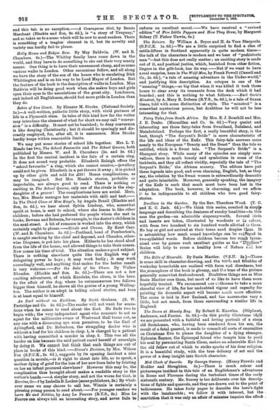We may put some stories of school life together. Mrs.
L. T. Meade has two, The School Favourite and The School Queens, both published by Messrs. W. and R. Chambers (5s. and 3s. 6d.) In the first the central ineident is the fate of a certain ring. It does not sound very probable. Elizabeth Raleigh offers the "school favourite" a ring, which she cannot receive,—jewellery could not be given. Elizabeth in a pet throws it away ; it is picked up by other girls and sold for £30! Hence complications, as may be imagined. But Mrs. Meade's stories, probable or improbable, are always good to read. There is nothing so exciting in The School Queens, only one of the rivals is the step- daughter of a grocer ! The complications here are social. Here, too, Mrs. Meade manages her materials with skill and tact.
In The Third Class at Miss Kaye's, by Angela Brazil (Blackie and Son, 2s. 6d.), we hear about Sylvia Lindsay, who, somewhat spoilt at home, is sent to school, where she learns to like other children; before she had preferred the people whom she met in books, Rowena and Rebecca, for example, to the doctor's children in the next street. A bit of romance is worked into the story, which certainly ought to please.—Rivals and Chums. By Kent Carr. (W. and R. Chambers. 3s. 6c1.)—Portland, head of Pemberton's, is caught smoking by the chief and deposed, and Chandos, other- wise Diogenes, is put into his place. Hitherto he has stood aloof from the life of the house, and allowed things to take their course. Now comes his time of trial. The situation makes a good subject. There is nothing elsewhere quite like this English way of delegating power to boys ; it may work badly ; it may work exceedingly well, and anything that makes for the better result is very welcome.—For the Sake of his Chum. By Walter Rhoades. (Blackie and Son. 3s. 6d.)—There are not a few exciting adventures, of which Kerslake, the chum, is the hero. In the affair of the dog, where he outmanoeuvres two fellows bigger than himself, he shows all the genius of a young Welling- ton. The author is an adept in telling school stories, and here is at least equal to himself.






































































 Previous page
Previous page